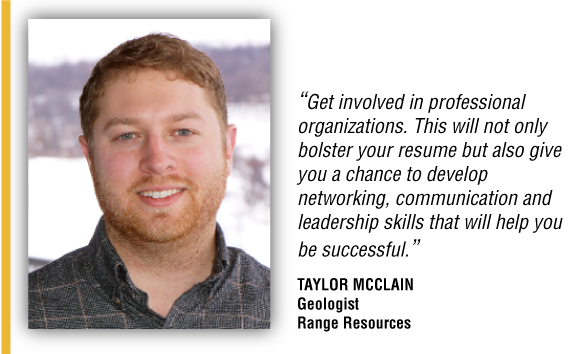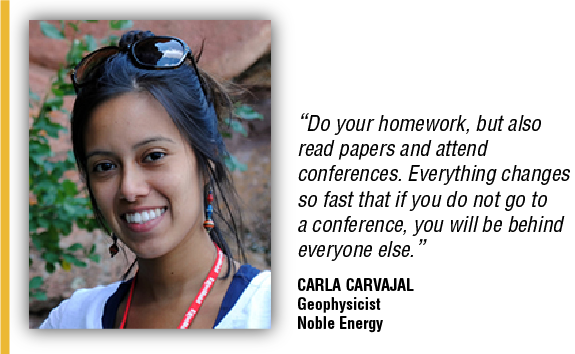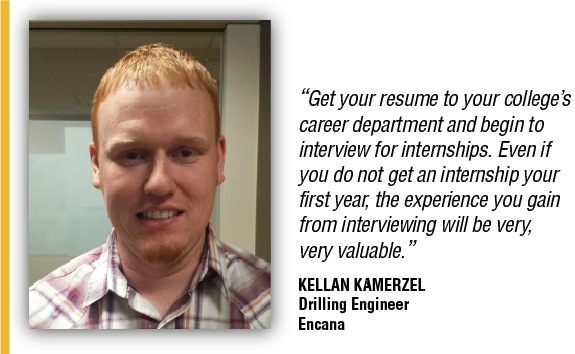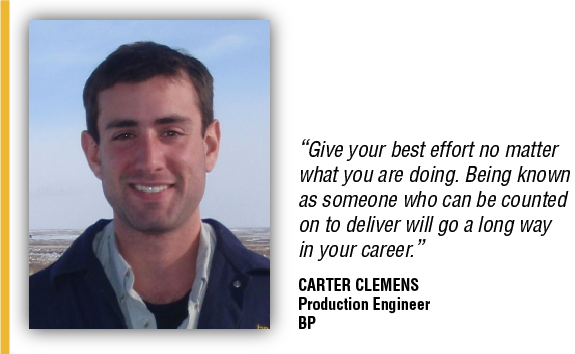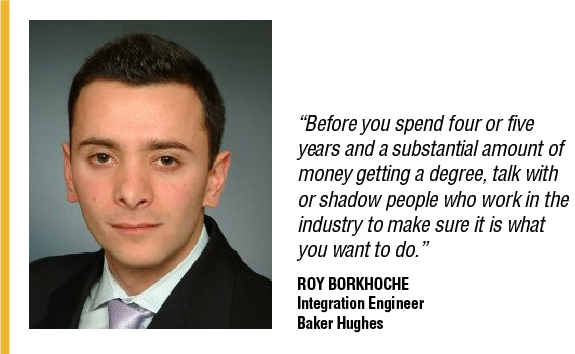
Career Advice
Internships Key for Young Geologists and Petroleum Engineers
By Colter Cookson
With its fast pace, global opportunities, and vital role in maintaining living standards, the oil and gas industry offers some of the world’s most rewarding careers. But it also is demanding. To take advantage of the industry’s many opportunities, college students interested in becoming geoscientists and engineers must learn to solve challenging problems and make hard decisions.
Of course, that is part of the fun. For students who embrace challenge, the question should not be, “Do I have what it takes?” but, “What can I do to get the most from my education and the first few years of my career?”
After a year as a geologist with Range Resources Corp., Taylor McClain has the professional experience to put his college years in perspective. “Get involved in professional organizations,” he urges. “This will not only bolster your resume but also give you a chance to develop networking, communication and leadership skills that will help you be successful.”
McClain encourages students to present at industry conventions, and attend career fairs and recruiting events. “These are the perfect places to connect with employers and get your resume out there,” he says.
Professors can be students’ best resources for career help, McClain adds. “Many worked in the industry before moving to academia, and can offer advice on writing and revising a resume. They also would be happy to introduce you to people they know, such as former students,” he says.
McClain also encourages students to seek intern positions. “Internships provide invaluable industry experience and can lead to a full-time job with the company,” he asserts.
Internships also give students a chance to see what it would be like to work for a company and determine whether it would be a good fit for them. McClain says he realized how important that is when he spent a few months with a much larger company before joining Range Resources.
“Finding a company with the right culture is important for your success,” McClain emphasizes. “I’ve been fortunate to work for a major and two independents this early in my career. The culture and management structure at Range have been perfect for me, which has made a big difference in my work attitude and performance.”
As an example of developing communication skills, McClain offers his experience with the American Association of Petroleum Geologists' Imperial Barrel Competition. In the event, each team receives a dataset with seismic, well logs, core data and drilling tests for an area where only one or two wells have been drilled. The task is to identify prospects and present them to a panel of judges.
“This mimics what it would it be like to have a prospect evaluation in a work setting, where you have to quickly come up with an answer and present that to management in a way that portrays the potential,” McClain says.
Geophysicist
Carla Carvajal, who received a master’s in geophysics from Colorado School of Mines before going to work for Noble Energy Inc., says students and young professionals should be prepared to change course if they discover the path they are on is the wrong one for them. To illustrate, she relates her experience after graduation from Simón Bolívar University in Venezuela.
“When I graduated, I was young and did not know what I wanted to do, so I did the first thing I had an opportunity to do. I started in seismic processing and imaging. It was a good experience, but I realized it was not my thing, so I switched to reservoir interpretation,” she says.
After doing seismic processing and imaging work for a research company in Brazil, Carvajal says she decided to advance her career by pursuing graduate study. “If you have the curiosity for graduate school and a desire to do it, do it,” she urges.
Carvajal describes her graduate school experience as fantastic, saying she was accepted to the Colorado School of Mines’ Reservoir Characterization Project, giving her exposure to industry professionals from day one. She says, “I learned a lot from my professors and from the industry people, so I think it was the best thing I could have done.”
Carvajal believes graduate school went so well for her because she found a program that matched her interests. “When you are considering graduate schools, look at every university’s programs and pick one that suits your needs,” she advises.
Students at any level should try to learn outside of class, Carvajal says. “Do not take your classes and your professors as 100 percent of the reality. Do your homework, but also read papers and attend conferences,” she holds. “Everything changes so fast that if you do not go to a conference, you will be behind everyone else.”
Staying up to date can help students identify unanswered questions, which is important if they plan to do research, Carvajal notes. She adds that keeping current on industry affairs simplifies networking. “If you read papers, you will have something to talk about at conferences and other industry events,” she says.
Once students enter the workforce, Carvajal encourages them to seek advice from experienced coworkers. “There are things you learn at school, but there are other things only experience can give you. Do not be afraid to ask questions, even if you think they are dumb,” she offers.
Carvajal also recommends talking with coworkers from other departments “When you are in a team, you need to put yourself aside and understand what everyone needs,” she poses. “Sometimes, you will want to do work that satisfies your curiosity but is not important for the rest of the team. Try to focus on what is important for all. If you do that, you will succeed.”
Drilling Engineer
For Kellan Kamerzel, an engineer with Encana Corp., the key to excelling in college is to seek experience outside it.
“Get your resume to your college’s career department and begin to interview for internships,” he urges. “Even if you do not get an internship your first year, the experience you gain from interviewing will be very, very valuable.”
Kamerzel, who in 2012 set Michigan’s record for lateral length and total measured depth by drilling a well with a TMD of 19,972 feet and a 10,000 foot lateral, learned internships’ value the hard way.
During the summer after his first year of college, he worked at a construction company rather than seeking an oil and gas internship. “When I got back, the other students would talk about a piece of equipment or a practice they learned during the summer and apply it to what was being taught,” he recalls.
“My sophomore year, it was tough getting an internship because I did not have one the year before. Thankfully, I was able to get on with a mud logging company,” Kamerzel continues. “I spent my summer on location in North Dakota and not only learned about mud logging, but also got to spend time with the driller, the tool pusher and the company man and learn what roles they played in getting a well drilled. When I got back, the real-world experience made what was being taught in school click.”
Because such experience is so important, Kamerzel says internship seekers should apply to several companies instead of restricting themselves to the one they find most appealing. “Anything you can do to gain industry experience is far more valuable than doing nothing at all,” he stresses.
Kamerzel advises freshmen to take their studies seriously. “Starting with a high grade point average and maintaining it is far easier than starting low and trying to work your way up to a higher GPA,” he says. “I had to do that, and it taught me how important it is to start college on the right foot.”
Because the industry is a tight-knit group, Kamerzel encourages students to treat well their peers and the professionals they meet. “If you act in a way that is unpleasant, it could come back to bite you,” he warns.
As students transition from school to work, Kamerzel recommends they think about where they want to be in five to 10 years, then sit down with their supervisors and lay out a development plan. “Having that dream in front of you will give you a reason to come to work and really try,” he says.
Young professionals also should start planning for retirement, he suggests. “As boring as it may sound, sit down with a financial planner or look at a retirement calculator and plug some numbers in, because what it takes to retire and maintain your lifestyle can be eye-opening,” he asserts. “The younger you start, the better off you will be.”
To keep work stress manageable, Kamerzel says young professionals must learn to accept their mistakes. “In our industry, those mistakes come with a large price tag,” he acknowledges. “However, try to keep them in perspective, and remember that the people who are managing you went through the same thing.”
Kamerzel says that even in the often frantic oil and gas industry, young professionals should take the time to think through their decisions. “It is okay if you do not know the answer to something,” he assures. “Instead of making decision immediately, take an hour to think and call on the experts in your field, so you can soak in their advice. This will help you make a sound decision and shed some of the stress associated with it.”
“There are appropriate times to hand your work to somebody else, and turn the phone off so you can take a vacation,” he adds. “We get passionate about our work, so that is hard to do. However, the time away is very, very valuable. You will come back energized and ready to hit the ground running.”
Production Engineer
Even in an exciting major, college often means doing work that is tedious, observes Carter Clemens, a production engineer who has spent the past five years with BP plc. He says that work will be easier if students remember its practical applications. “When you know that solving a problem could lead to improved efficiency or result in a safer process, the end result becomes much more rewarding,” he holds.
An internship can provide that understanding, even if it focuses on menial tasks, Clemens says. “For my first internship, I washed and disassembled subsurface equipment, such as liner hangers,” he recalls. “That gave me some of the best knowledge I could have asked for about downhole completion equipment, which has helped me be successful in my current job.”
Clemens reports the internship also taught a more general lesson. “Be open to helping with tasks that are essential to the end goal, even if they are not glamorous, and give your best effort no matter what you are doing,” Clemens advises. “Being known as someone who can be counted on to deliver will go a long way in your career.”
Because the oil and gas industry often involves working in teams, Clemens urges students to develop their leadership, teamwork and social skills. “When you are with people who are willing to work together, have good people skills and are technically sharp, it is amazing what gets done,” he says.
“Be open to new challenges and unexpected opportunities,” he adds. “In my experience, that attitude will pay off, especially at a large company.”
As an example, Clemens cites his decision to take a position in Abu Dhabi. “That chance came as a surprise to me, but it has been a great experience,” he says. “If you are at the right stage in your life, I would encourage you to work internationally. You get to see new challenges and cultures, and both are learning experiences you can use for the rest of your life.”
In Abu Dhabi, Clemens says he has had to overcome language barriers. “I work with people from the United Arab Emirates, Egypt, Colombia and India. Everyone speaks English, but for most of us, it is a second language, so we have to be patient and make sure we understand each other correctly.”
Integrator
Baker Hughes Strategic Integration Engineer Roy Borkhoche encourages students to make sure they know what they are getting into. “Before you spend four or five years and a substantial amount of money getting a degree, talk with or shadow people who work in the industry to make sure it is what you want to do,” he advises.
Even people who are certain they want to become petroleum engineers or geoscientists should ask professionals for details about their workday, Borkhoche suggests. To explain why, he uses petroleum engineering. “There are several disciplines within the field: reservoir, drilling, production and facilities,” he notes. “After you graduate, you probably will specialize in one. Classes and faculty can help you figure out which one, but it is best to talk to people from each discipline.”
As Baker Hughes’ campus champion for Pennsylvania State University, Borkhoche helps the company recruit by meeting and talking with students. He says he is impressed by the ones who research companies before an interview and come up with questions. “You do not need to know much, but you should at least understand what the company you are talking to does,” he says.
If that company’s representatives invite you to contact them with questions or comments, follow up, Borkhoche adds. “Simple things like sending a thank-you note or e-mailing every once and a while to talk about your progress will go a long way when the company is looking for people to hire,” he says.
Borkhoche encourages students who are having trouble finding internships or jobs to talk with their professors. “If a professor tells me someone is a Grade A individual even though their grade point average might not reflect it, I will talk to that person and see if they are someone I want to recommend for hiring,” he attests.
“On your first day at work, make a good impression,” he stresses. “Show up on time. Go to the office the night before to make sure you know how to get there, and leave early so you arrive on time, even if traffic is heavier than you expect. Be clean and well-dressed. It is better to be overdressed than underdressed your first day, because first impressions last.”
Employees also should show enthusiasm and a willingness to do whatever needs to be done, Borkhoche continues. “Do not say, ‘You want me to clean an Excel file? I did not go to four years of college for that,’” he warns. “If you want the rest of the team to trust you and rely on you, you need to show you’re willing to help in any way you can.”
Young professionals who put their best foot forward will get more from their coworkers, Borkhoche promises. “If you show a desire to learn, take the initiative, and follow through on your promises, we will teach you everything we know and make sure you develop as a person and advance within the company,” he says.
For other great articles about exploration, drilling, completions and production, subscribe to The American Oil & Gas Reporter and bookmark www.aogr.com.














